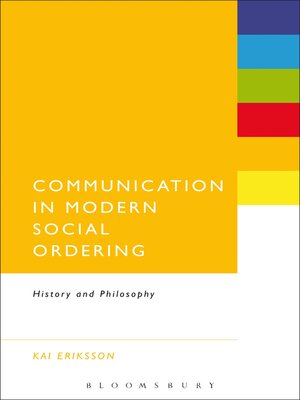
Sign up to save your library
With an OverDrive account, you can save your favorite libraries for at-a-glance information about availability. Find out more about OverDrive accounts.
Find this title in Libby, the library reading app by OverDrive.



Search for a digital library with this title
Title found at these libraries:
| Loading... |
Communication in Modern Social Ordering investigates the modern history of communication in relation to the thinking of the political community in the United States. By illustrating the intertwining of the technological developments in communication methods and its community-building effects, the different representations of society and their political implications are examined against the development of communication systems from the telegraph, to the telephone, to computer networks.
It was the telegraph that made communication a continual process, thus freeing it from the rhythmical motion of the postal service and from physical transportation in general, and provided both a model and a mechanism of control. Using the theories of both Foucault and Heidegger to provide a lens for new investigation, the author studies not the meanings of communication and its logic as such but rather the conditions and structures that allow meanings and logic to be formulated in the first place.
The book offers an original combination of historical analysis with an ontological discussion of the evolution of telecommunications in the U.S. as a phenomenon of modern social ordering.
It was the telegraph that made communication a continual process, thus freeing it from the rhythmical motion of the postal service and from physical transportation in general, and provided both a model and a mechanism of control. Using the theories of both Foucault and Heidegger to provide a lens for new investigation, the author studies not the meanings of communication and its logic as such but rather the conditions and structures that allow meanings and logic to be formulated in the first place.
The book offers an original combination of historical analysis with an ontological discussion of the evolution of telecommunications in the U.S. as a phenomenon of modern social ordering.






